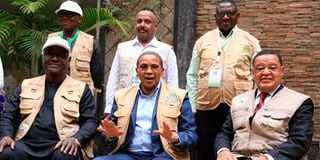Chebukati earns big kudos from poll observers for ‘job well done’

Seated from left: Retired presidents Ernest Bai Koroma (Sierra Leone), Jakaya Kikwete (Tanzania) and Mulatu Teshome (Ethiopia) address journalists at Serena Hotel in Nairobi on August 11, 2022. Jeff Angote I Nation
What you need to know:
- The observer missions in Kenya also praised the National Police Service for their professionalism at the polling stations.
- On the failure of Kiems kits to identify some voters, Mr Kikwete asked the IEBC to note such issues and take corrective action for future elections.
- The AU-Comesa observer mission noted that despite the relatively high youth population, there was a low number registered to vote.
Election observer missions to Kenya have praised the electoral commission for professionally carrying out a smooth election despite reported cases of failed voter identification kits in some polling stations.
The East Africa Community, the Intergovernmental Authority on Development (Igad), the Commonwealth and the African Union (AU)/Common Market for Eastern and Southern Africa (Comesa) observer missions in Kenya also praised the National Police Service for their professionalism at the polling stations.
However, the team faulted the use of state resources during political campaigns, failed Kenya Integrated Election Management System (Kiems) kits in a number of polling stations, low voter turnout and lack of youth participation in both elective posts and voting.
“The mission takes note of the remarkable improvements made by the IEBC [Independent Electoral and Boundaries Commission] in regard to transparency, preparations, and management of the 2022 Kenya General Election,” said EAC observer mission leader, former Tanzanian president Jakaya Kikwete.
“However, much more needs to be done for better outcomes in future. The mission also recommends that in future, there should be better communication between the IEBC and the various stakeholders.”
Transparency
He commended the police for not interfering with voting and said technology had improved efficiency and increased transparency, unlike in previous elections.
On the failure of Kiems kits to identify some voters, Mr Kikwete asked the IEBC to note such issues and take corrective action for future elections.
The AU and Comesa took issue with the use of state resources during campaigns, which “created an unlevel playfield, especially for smaller campaign players” according to the mission’s leader, former Sierra Leone President Dr Ernest Bai Koroma.
The AU-Comesa observer mission noted that despite the relatively high youth population, there was a low number registered to vote.
“Only 39.84 per cent (8.8 million) of the total registered voters were youth, a decline of 5.17 per cent from the 2017 figures,” said Dr Koroma.
The mission also noted the late release of funds to IEBC by the National Treasury, saying it affected key electoral processes including voter registration, verification of voters’ register, and voter education.
The elections witnessed a high level of participation of political parties and independent candidates. Out of the 90 registered parties, 81 contested the elections. Of the 16,105 candidates, 28.1 per cent were independent candidates.
Commonwealth Observer Group Chairperson Bruce Golding said the elections were largely peaceful and praised the efforts by political parties, their leaders, presidential candidates, and the public to foster a peaceful environment in the lead-up to the 2022 General Election.
“We noted that voters were largely able to cast their ballots freely. The elections were competitive, with freedom of association and participation rights provided for and respected,” said Mr Golding. He said the lack of a comprehensive review of the Elections Act and Kiems kit failures cast a shadow over the entire process.
“It is noted, for example, that the issue of whether the digital or printed register would be the primary mechanism to verify voter identity was only decided the day prior to the elections, following a ruling by the Court of Appeal,” he said, and recommended “the establishment of a specialist court to deal with election-related matters.”





